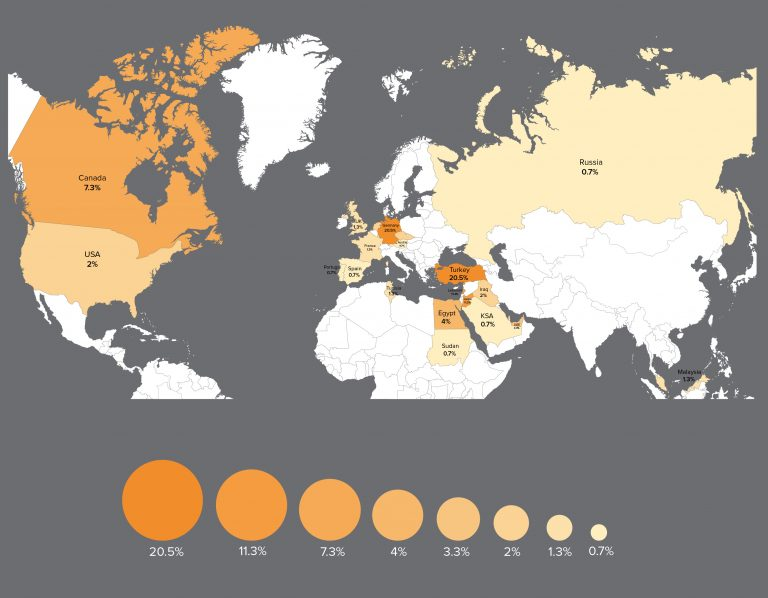World With Limited Possibilities: How COVID-19 Is Affecting Refugees Entrepreneurs
May 27, 2020

By Ahmad Sufian Bayram, Techstars Regional Manager EMEA
Since the beginning of 2020, COVID-19 has been ripping through countries around the world, throwing health systems and economies of all sizes and potential into an unprecedented crisis. With strict movement protocols and stay-at-home orders in place around the world, businesses have been forced to close, flights canceled, and financial markets are in a tailspin.
The risk from the virus transcends social classes and cuts across communities. One category made vulnerable in this crisis is refugees, particularly those living in already inadequate, overcrowded communities with limited health and sanitation facilities and now also experiencing enhanced immobility. An outbreak of the virus in such gatherings can lead to a catastrophe.
The majority of refugee-hosting countries, not least in the Middle East and Africa, already have fragile economies. A policy brief released by ESCWA featuring an economic assessment of the cost of the pandemic on the MENA region warned of job losses at an alarming rate due to COVID-19.
Fadia, a 56 years old single mother of six children living in a border village in Lebanon, is just one of those hit hard in the recent restrictions. With a small plastic-bag recycling and crochet stitching business, she woke up on March 19, 2020, to learn about new rules issued by the local authority to close all shops. Her business was one of many, deemed ‘non-essential’, to close in the village. With savings that lasted for two or three days, Fadia’s family faces an unknown future.
Fadia is not alone, thousands of other refugee entrepreneurs. The long term impact of COVID-19 is expected to exacerbate the vulnerability of some of the 272 million international refugees worldwide. The livelihoods of millions are in danger since many rely on daily income to get on with life. The majority are working in informal markets. Losing their job means dwindling livelihood opportunities, ultimately leading to more negative coping mechanisms, such as relying on children to provide income, or cutting back on basic needs such as food and baby milk.

The average distribution of Syrian businesses by country.
Entrepreneurship is the way forward
Unemployment and joblessness are significantly impacting refugee and Syrian communities who have little or no buffers to protect them during this time. As 2020 risks becoming a ‘shutdown year’ for traditional businesses, entrepreneurship is now needed more than ever.
While local startups have relied on the funding support offered by local governments targeting impacted industries and markets, the vast majority of refugees businesses are working in the informal market, leaving them without any assistance.
While more and more businesses are moving to online work to market products and services, refugee entrepreneurs risk being out of the game as they face dwindling resources and limited capacities. According to UNHCR, refugees are 50 percent less likely than the general population to have an internet-connected mobile phone. While 20 percent of rural refugees have no access to connectivity, urban refugees often have access but cannot afford to get online.
Many refugees left school due to the war and missed out on important learning that should help them navigate this world. Online work usually requires new and advanced skill sets. Receiving wire is a particular issue that can often single-handedly cause a work opportunity to go wasted. Receiving payments can always pose a challenge for refugees in many of the host countries, especially those who do not have a residency. Also, access to electricity and computers as basic requirements are not available to a significant range of refugees.
Many studies indicate that entrepreneurship has an essential role in combating unemployment. When it finally shows signs of abating, the COVID-19 Crisis impact on the refugee community will have left irrevocable destruction. The human cost is always the most tragic, and the magnitude of the financial consequences might reach levels that defy all proportions. It thrusts the question of post-crisis economic support to the forefront of the concerns.
Light at the end of the tunnel
Amid all of this, entrepreneurship, if efficiently deployed, can be a dynamic for growth and long-term renovation. It has the potential to boost economic recovery while improving access to essential services. It can spark unprecedented competition, triggering a wave of innovation, tech-based jobs, and eco-friendly trends.
Refugees entrepreneurs should be encouraged to provide services that not only generate income and make job opportunities available but also directly serve their communities and benefit those in need. It is the humanity of the business that will bring it closer to the most-affected population. This will build local expertise and pave the way for future contributions to comprehensive development.
The post-COVID-19 crisis era will highlight entrepreneurship's role as a catalyst for development. Policymakers should start to consider assisting refugees entrepreneurs in their endeavor to create businesses that can benefit both communities, which has manifested over decades and centuries, beginning with the Industrial Revolution of 1760, when the spirit of innovation-led a remarkable manufacturing transition in Europe. If there is anything to learn from similar experiences, it is the need for societies to embrace, encourage, and trust entrepreneurship. It suddenly becomes about which half of the cup we see.
About the Author

Ahmad Sufian Bayram
Ahmad is an award-winning social entrepreneur and author focused on supporting vulnerable communities, including those in conflict and fragile societies, and refugees to access entrepreneurship.
He works as Europe, Middle East, and Africa Regional Manager at Techstars and has been helping hundreds of Syrians to gain access to entrepreneurship opportunities and build a supportive environment.
He has written, “Entrepreneurship In Conflict Zones”, “Entrepreneurship in Exile,” and “Relentless” to shed some light on the status quo of Syrian founders, in conflict zones, and as refugees in host countries.
